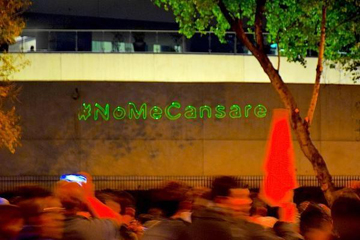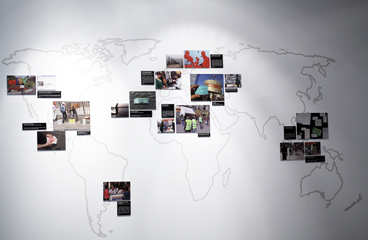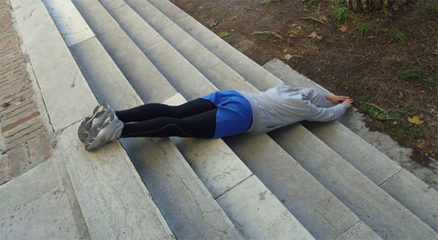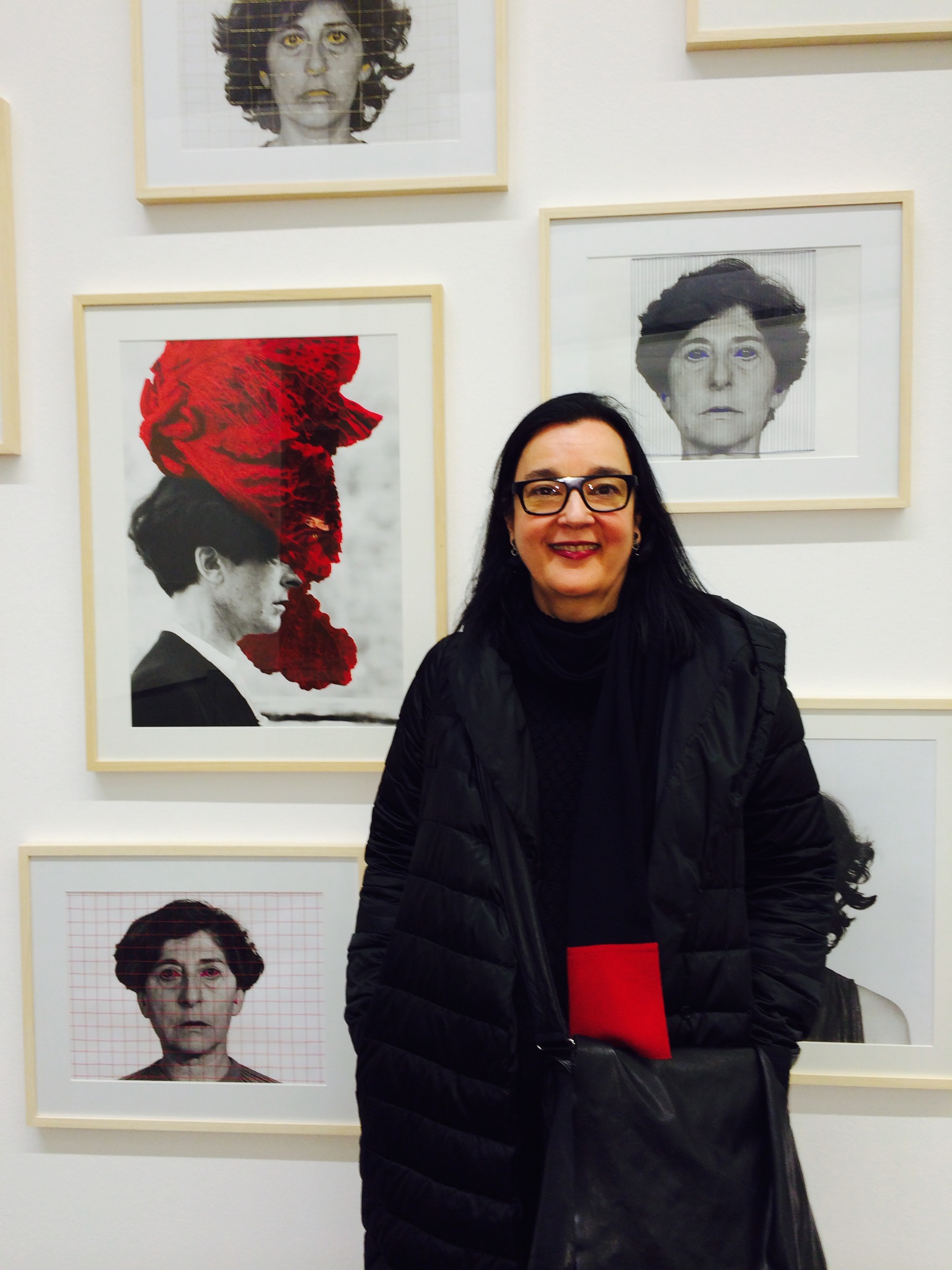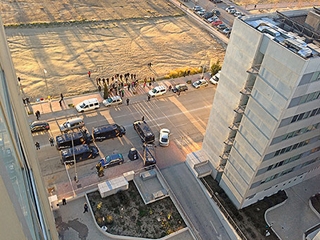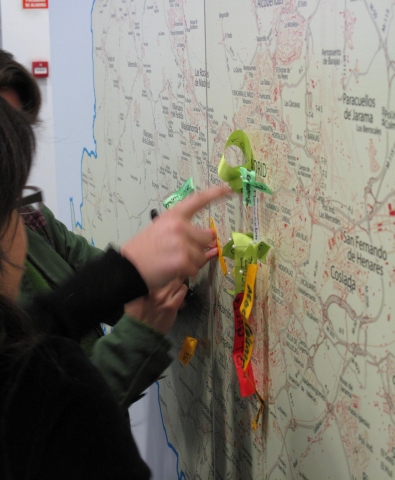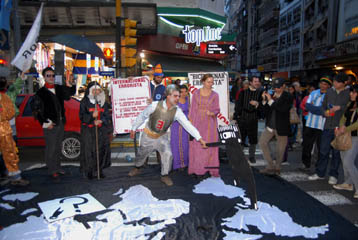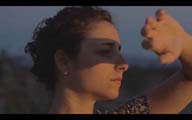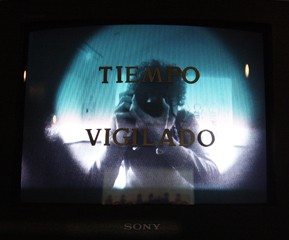Organised by: Instituto de Transición Rompe el Círculo
Offices: Rompe el círculo (Plaza del Turia, 2, Móstoles), EnRedArte (Francisco Javier Sauquillo, 3) and CA2M
Free entrance
There is an incipient need to speak in terms of a crisis of civilization. The multi-faceted nature of the current-day social turbulence exceeds all partial categorizations. And it does so under all of the different banners that have become so widespread in the journalist, academic or political discourse: economic, financial, energy, environmental, food, dietary and care crises, to mention but a few. There are so many open fronts that it is no longer possible to interpret the situation within the habitual parameters of the economic cycles, and all the signs would appear to indicate that we are facing the bankruptcy of the capitalist civilizing model. That is, a departure from this civilization model in which its characteristics (dominance of the fetishist social manners; merchandise, value, abstract work and money) render it unique compared to other social forms from former times and other places.
Phenomena such as climate change, the energy decline, the depletion of strategic minerals or the suffocation of the capitalist accumulation process itself, all forewarn that the world as we know it is on the verge of an unprecedented change. In this context, the socio-economic elites are taking positions with a view to maintaining the predominant status quo at the cost of increasing exploitation, suppressing social and political rights, and focusing on an environmentally suicidal forward-moving escape. Citizens in general, and the social movements in particular, are faced with a dual task: to resist the pressure of the ruling classes and to find the capacity to build emancipating societal alternatives in a world obliged to decelerate.
This education cycle aspires to being a meeting point for the southern area of Madrid, revolving around two main objectives: on the one hand, to lay the foundations for a correct diagnosis of the present moment in time and its economic, social and political implications; and on the other, to raise awareness and collectively debate various experiences centered on the construction of alternatives to set in motion a process of transition to a post-capitalist world.
PROGRAM
SATURDAY 11 JAN. 18:00 IN ROMPE EL CÍRCULO
What is capitalism? Unravelling the commodity-based civilisation
Instituto de Transición Rompe el Círculo
Although the capitalist reality awakens opposition and resistance wherever it takes root, comprehension of the same remains an unsolved issue for those of us fighting against it. Capitalism is a highly slippery term, that combines an exuberant polysemy that is very generally used, rarely considered problematic and which, in the majority of cases, feeds off a misinterpretation: Engels’ deformation of Marx’s thinking, which was subsequently popularized by Leninism. The role played by this error in the defeat of the anti-capitalist approaches should not be underrated. Using the readings of Marx that have emerged in recent decades (Heinrich, Kurz, Postone), the aim of this talk is to offer a straightforward, collective and accessible analysis of the fundamental characteristics of the capitalist social formation. Its objective is to help clarify the horizon of an anti-capitalist project, thus placing the common sense of the popular struggles on the same wavelength as the reality of the enemy they face.
The Instituto de Transición Rompe el Círculo is a group which has been working since 2008 to build alternatives in pursuit of a post-capitalist and post oil-peak transition in the Southern Madrid area.
SUNDAY 19 JAN. 18:00 IN ROMPE EL CÍRCULO
Crisis or decline of the capitalist model? On the internal limits of capital accumulation
Jordi Maiso
In the years following the «end of an era» as constituted by the year 1989, criticism of the Marx-style economic policy was considered a closed chapter in the history of thought, and to obstinately persist in criticizing capitalism seemed typical of those determined to ignore the new sign of the times. They were the euphoric «end of history» and «end of ideologies» years, and the imposition of the market economy on a global scale foretold the materialization of a One World system that would overcome the divisions between blocks and open up an era of world-wide prosperity. Two decades later, these expectations have proven themselves false. Following a brief period of prosperity on credit, with feet of clay, globalised capitalism has left in its wake a scene of new inequalities, poverty of the masses, a population increase that cannot be integrated into the production system and a chain of financial bubbles that, from 2008 on, culminated in a global crisis. In the face of this scenario, Marx appears to be more than a mere specter, and his analysis of capitalism awakens an interest level that goes beyond the strictly academic. The imperative question in light of the global crisis situation is whether this is a temporary phenomenon or the beginnings of the capitalist socialization model decline, which had reached its inner limits and is now entering a phase of decomposition.
Jordi Maiso is a doctor of philosophy, linked to the Human and Social Sciences Centre (CCHS) of the Spanish National Research Council (CSIC). His most important lines of work are: Critical Theory; philosophy following Auschwitz; forms of socialization in advanced capitalism; ethical-political challenges of synthetic biology.
THURSDAY 23 JAN. 19:00 IN CA2M
Growth limits I: the energy decline
Antonio Turiel
Since 2005, crude oil production has been gently dropping yet it now appears to be undergoing an acceleration. This fundamental historical occurrence has gone unnoticed amidst the media fanfare about new hydrocarbon sources, from biofuels to fracking, and even including the oil sands of Canada, in an attempt to disguise the fact that these substitutes are neither as versatile as crude oil nor offer such a good energy and economic yield. This crucial fact has been silenced in the media. The rare occasions on which it is mentioned, it is as «the end of cheap oil», without explaining that it was precisely cheap oil that made the expansion of capitalism possible in the first place, and that the lack of the same may give rise to the collapse of this economic system, and in turn, of our society. The entire energy debate is distorted, given that the non-renewable options (whether coal, natural gas or uranium) are also close to their zenith, while the renewable sources have so many limitations, always ignored, that they could never provide the vast amounts of energy currently enjoyed.
The end of the expansive cycle of energy availability and its inevitable contraction does not necessarily imply the end of modern society, and far less so the collapse and extinction of the same, but it does give rise to the end of growth −growth of the population, of the GDP, of trade, of capital− and therefore the end of the capitalist system. Such a possibility is unacceptable from a political perspective, and therefore an ideological response is given (in the shape of denial and cover-ups) to what is a simple matter of logic (the limits of the planet and of the human being). The progress discourse has introduced the myth of the homo invictus into the collective psyche, of man capable of overcoming any obstacles faced, even when to do so the fundamental laws of nature must be broken. Nowadays, to point out limits and impossibilities is considered reactionary and obscene, even when using a scientific argument.
The objective of this lecture is to rationally discuss why the energy decline is inevitable, as well as widely known, and why this will lead to the end of growth. There will also be a brief discussion of the implications of this historic moment.
Antonio Turiel is a doctor of physics and member of the Marine Sciences Institute of the Spanish National Research Council (CSIC). For years, he has been responsible for the fundamental task of raising awareness about the energy problem faced by modern societies. His blog The oil crash has become a point of reference for anyone interested in the 21st century energy decline.
SATURDAY 25 JAN. 18:00 IN ROMPE EL CÍRCULOç
The Internet and new technologies: liberation or submission?
Cul de Sac
To review the new technologies, we must first position them within the framework of a broader reflection on technique. To oppose technique in its entirety makes no sense as it alludes to all relations between the human being and their environment. Our approach is as follows: what level of technical development is possible and desirable in a truly free, horizontal and completely oppression-free society? We believe that «technology» born of the application of science to technique in the context of industrialisation has led to more alienation and submission than progress, and it is our opinion that the Information and Communication Technologies are nothing more than another step on the journey towards the artificialisation of the our living conditions which remove us, even further if possible, from the possibilities of living a life worth living.
Cul de Sac is a critical thinking publication focused on injecting new life into the reflection on the old «social question». Following a line close to that of authors critical of the technical phenomenon, its first issues contained excellent monographic editions on the idea of Progress and the current role of the Information Technologies.
SATURDAY 15 FEB. 18:00 IN ROMPE EL CÍRCULO
Collective consumption as a tool for change
Carmen Madorrán
The space for hope is open, as each day more and more initiatives call for responsible and fair consumption, a conscientious and transforming, collective and sustainable consumption. From the cooperatives and consumer groups, time banks, exchange groups, community vegetable gardens or energy cooperatives, among others; to the exchanges of homes, cars, clothes or resources: work tools, work space, etcetera. In short, we suggest considering this proposal of collective and responsible consumption within a process of global change, within a sort of «transition» towards a different model of both life and consumption, both an energy and a production model which will lead to a change in the group comprehension, in the way humans relate to the rest of the living beings and to the planet.
Carmen Madorrán is a philosopher and researcher with the Universidad Autónoma de Madrid. She is co-author of a number of books on the socio-ecologic crisis published by Akal, Icaria and Los Libros de la Catarata.
THURSDAY 20 FEB 19:00 IN CA2M
Correlations between the economic crisis and the ecological crisis
Joaquim Sempere
Capitalism, and its situations of over-accumulation that result in speculative phenomena that are utterly destructive of economic life -associated with social inequalities-, is, for this very reason, destined to generate social unrest and chaos. The severity of this perspective will become more pronounced with the growth of the ecological crisis, the first massive sign of which will undoubtedly be the depletion of the fossil and nuclear resources. The current deregulated capitalism is the least appropriate system to preventively deal with this phenomenon (through the passage from an energy model based on renewables and a reduction of production and consumption), and it is headed for a worsening of the chaos and social injustices.
Joaquim Sempere is a doctor of philosophy, translator, anti-Francoist activist, columnist of the newspaper, Público, and professor emeritus of sociology at the University of Barcelona. He is currently working, among other things, on the convergence between the ecological and the economic crisis. Along these lines, he published the essay, El fin del petróleo barato, in 2008.
THURSDAY 27 FEB. 19:00 IN CA2M
Urban development and the socio-ecological crisis
Pilar Vega
This lecture will explain how the productive, territorial and transport model has transformed the ecosystems. Its impact on urban settings has materialized in an extension of suburbanization, the vulgarization of the landscape and the artificiality of the space. Yet it has also caused a pillaging of the resources needed for the functioning of cities in other ecosystems. These impacts equally affect the power relationships. Productive, rehabilitated, renewed, ordered and integrated cities that expel the undesirables of the model towards the outskirts. Unbalanced, unfair, violent, and therefore unsustainable, cities. To conclude, the possible reconstruction of the model departing from a territory and a society in crisis.
Pilar Vega is professor of Human Geography at the Universidad Complutense. Her field of activity revolves around territorial and environmental planning, as she is a specialist in transport. She has worked on the Strategic Infrastructures and Transport Plan (PEIT) and the Green Paper on Accessibility in Spain.
THURSDAY 13 MAR. 19:00 IN CA2M
Who decides what we eat? Agroindustry versus food sovereignty
Esther Vivas
Who moves the strings of the agricultural and food system? Who determines what we buy, what price we pay, how what we eat has been produced? At present, each section of the food chain, from the fields to the plate, is in the hands of a small number of agroindustry multinationals, who give precedence to their individual interests rather than our collective needs. Food sovereignty is put forward as an alternative to this model.
Esther Vivas, a journalism graduate, she also has a Master's Degree in sociology, is an activist and researcher of social movements as well as food and agriculture policies. The author of various books on these areas, she forms part of the Centre d’Estudis sobre Moviments Socials (CEMS) at the Universidad Pompeu Fabra.
SATURDAY 23 MAR. 18:00 IN ROMPE EL CÍRCULO
Genetically Modified crops in the Spanish State + presentation of the book La invasión molecular (CAE)
Blanca Ruibal and Emilio Santiago (prolog writer of the book)
This lecture will be divided into two blocks. In one part, we will approach the reality of the Genetically Modified crops and how widespread they are in the agrofood market of our country, analyzing the political, social and ecological problems entailed in this controversial technology, as well as the vested interests behind it. In the second part, we will take advantage of the presentation of the book, La invasión molecular to talk about the various ways of fighting against the genetically modified organisms.
Organised with GAK Rompe el Círculo
Blanca Ruibal is an ecological activist and manager of the Agriculture and Food division of the NGO, Amigos de la Tierra. Critical Art Ensemble (CAE) was a group that emerged from the intersection between art and political activism. Her book, La invasión molecular, delves deeply into the political and social implications of the biotechnologies based on genetic engineering.
SATURDAY 29 MAR. 18:00 IN ROMPE EL CÍRCULO
The organic food market
Cristina de Benito
This lecture will deal with the process of institutionalizing agro-ecology and the creation of the organic industry, offering data on the market and regulations both in Spain and on an international level. It will then go on to analyse the tensions that emerge in this respect due to the movements attempting to make agro-ecology a form of social transformation, but taking into account the logic the organic farmers are subjected to and the market need for the social reproduction of these projects.
Cristina de Benito is an anthropologist and researcher at the Universidad Autónoma de Madrid. She is writing her doctoral thesis on the transforming potential and contradictions inherent to organic food.
SATURDAY 5 APR. 18:00 IN ENREDARTE
The geopolitics of energy
José María Iniesta
The tumultuous world-wide geopolitical re-planning is determined by the race to monopolize the natural resources, particularly those revolving around energy, with historically unheard of competition levels. This lecture will attempt to shed some light on the current process of decline of the North American supremacy, the rise of China and the role of the rest of the world players, in a context marked by a growing and irreversible scarcity of raw materials which will tend to increase global tension and armed conflicts.
José María Iniesta has a degree in Political Science and is an activist of the Instituto de Transición Rompe el Círculo.
SATURDAY 26 APR. 18:00 H IN ROMPE EL CÍRCULO
Growth limits II: Climate change and the depletion of materials
Jorge Riechmann
At present, the carbon dioxide and methane emission levels are similar to those of the «Ecocene Hothouse», 55 million years ago, when the temperature rose by an average of 5º in the tropics and 8º in the warm latitudes, and the planet took 200,000 years to recover a certain degree of climatic balance. And in the space of one century, the industrial societies have degraded a significant part of the base reserves of non-energy minerals. All of this would indicate that we have gone beyond the point of no return, in ecological-social terms. Is sustainability still possible?
Jorge Riechmann is a doctor of Political Sciences and professor of moral philosophy at the Universidad Autónoma de Madrid. Poet, essayist, translator, activist of Ecologistas en Acción and Izquierda Anticapitalista, he is one of the key figures in the Spanish language eco-socialist thinking.
SATURDAY 10 MAY 18:00 IN ROMPE EL CÍRCULOç
Experiences based on the neo-rural (round table)
Duarte Artabe, Javier de Miguel, Álvaro Sanz and Alfonso Serrano
The return to the fields is a recurrent theme in debates on sustainability and a transformation strategy ever more deeply rooted in the social movements. Following a general overview of this historical social process, in which we will ask ourselves what all these initiatives have in common to be considered a unit, a round table will take us close to the various neo-rural practices from the perspective of their protagonists' experiences.
Duarte Artabe is a farmer, and entrepreneueur of the neo-rural project, Pumido ao Natural in the area of Ferrolterra (Galicia). Javier de Miguel is a member of a neo-rural community in El Berrueco. Álvaro Sanz is a shepherd and libertarian activist on the hillside of Somosierra. Alfonso Serrano is the director and editor of the publishing house, La Oveja Roja and has lived in Comminges, a village of St Bernard (Midi Pyrenees) for 5 years, and a year in a village to the north of Bastia (Corsica).
THURSDAY 22 MAY 19:00 IN CA2M
Preparing the energy decline: a roadmap
Lino Blanco, member of the Asociación Véspera de Nada por una Galiza sen petróleo
The Oil Peak represents the physical impossibility of continuing with the current civilization model. Industrialism, capitalism and perpetual growth are unfeasible from the moment in which this crucial yet non-renewable raw material no longer supplies the ever-increasing energy amounts required. The Guía para o descenso enerxético recently published in Galicia, aims to offer criteria to allow the actual citizens to urgently and decisively adapt in the face of this unprecedented panorama in the history of mankind.
The field of application of this guide should not be exclusively restricted to Galicia, even if it has been developed by and for Galicia. All the alternatives to obtain, generate, distribute and consume energy are applicable to any territory. The priorities the available energy should be concentrated on, whether to obtain food or to ensure the safety of a limited few, will determine the time before violence becomes widespread. The choice between a society dominated by warlords and a charitable society, will be determined by access to energy. The availability of energy, its production and consumption will mean that "power" be imposed by a minority rather than a majority.
The association, Véspera de Nada por unha Galiza sen petróleo, is a group from Galicia which has been working for six years to raise awareness of the oil peak problem and towards the organization of alternatives to deal with this energy decline.
SATURDAY 31 MAY 18:00. PUBLIC SPACE TO BE CONFIRMED
Anti-capitalist ways out of the crisis: Growth as a solution or as a problem?
Oscar Carpintero and Juan Pablo Mateo Tomé
Capitalism is in the grip of a heartrending contradiction: if it does not grow then it does not work, and if it continues to grow it will destroy the natural foundations that make it possible. In this talk-debate, we aim to establish a dialogue to find potential ways out of the crisis from an anti-capitalist perspective, with the controversial issue of economic growth as the centre of gravity. On this issue and from the protest movements, occasionally contradictory messages are launched. The debate generated around grants to the mining sector is one example of these contradictions. It is essential to find a common ground that enables us to combine the forced decline imposed on us by the material context of our times with the immediate survival needs of the popular classes.
Oscar Carpintero is a doctor of economics and professor of Applied Economy at the Universidad de Valladolid. An ecological economist, he has been a member of the International Society for Ecological Economics (ISEE) for years, and is also a member of the CIMA (Scientists for the Environment).
Juan Pablo Mateo Tomé is a doctor of economics and has been a professor at the Universidad Pontificia de Comillas. Positioned within the Marxist economy, he is co-author of the works, Ajuste y salario: las consecuencias del neoliberalismo en América Latinay Estados Unidos and Las finanzas y la crisis del euro. Colapso de la eurozona.
SUNDAY 8 JUNE, FROM 12:00 IN ROMPE EL CÍRCULO
Post-capitalist economic alternatives: self-management and cooperativism
12:00 Mapping of the cooperativist movement. Jorge Navacerrada 14:00 Popular lunch 15.30 Presentation of the local social currency 17.00 Cooperativism and self-management: presentation of the book La autogestión viva, by José Luis Carretero (ICEA); 19:00 The Integral Catalonian Cooperative: lessons from an experience, by Enric Durán –via Skype. 21.00 Celebrations
Cooperatives, self-employment, self-management, social economy... these terms are more and more in vogue and reflect a change in the way we understand the social struggles. An idea that is on everybody's mind: in a chronic crisis context we cannot solely focus on defending the job. In the same way we have occupied the squares, the time has now come to move on to the offensive and take over production. The aim of today is to provide a space of convergences in which to think and discover new modes of production which will serve as tools to generate a different socialization model, based on economic cooperation, that will allow us to build everyday post-capitalist realities.
Jorge Navacerrada is a member of the cooperative, Altekio Iniciativas hacia la Sostenibilidad, a cooperative project created to intervene in the fields of the environment, community development and the social economy. Jorge will outline, based on first-hand knowledge, a map of the cooperative movement at the current time, with its strengths and its weaknesses.
Jose Luis Carretero is a teacher, writer, lover of critical thinking and member of the ICEA (Institute of the Economic Sciences and Self-Management). His talk will focus on the self-managed cooperativist movement and its possibilities with a view to social emancipation, which he will deal with through the presentation of his book La autogestión viva. Proyectos y experiencias de la otra economía al calor de la crisis.
Enric Durán became known in the year 2008 for the expropriation of almost half a million euro from banking entities, money which was used to finance various social causes. In his talk, he will go over the experience of the Cooperativa Integral Catalana, a benchmark project in the state post-capitalist initiatives, touching on both its achievements and, above all, its problems and pending challenges.
Furthermore, on this occasion we will also enjoy the presentation of various social currency projects to be confirmed.
SATURDAY 14 JUNE 18:00 IN ROMPE EL CÍRCULO
The sky beneath the rubble: the anti-capitalist strategies under debate
José Manuel Rojo (Grupo Surrealista de Madrid) and Emilio Santiago (Instituto de Transición Rompe el Círculo and GSM)
With the presentation of the essay, El cielo bajo los escombros, by both of its authors, we wish to create a debate on the strategic possibilities of the anti-capitalist movements in the context of the crisis of civilization we are currently immersed in:
«The revolution project, as it was understood by the classic worker's movement, cannot survive the end of the material and energy abundance that inspired it. The historic spoils of the development of the productive forces have been lost. And will never return. Any social emancipation horizon we wish to head towards will demand, as a primary condition, an emergency landing. To save ourselves from this great leap, promoted by the myth of progress which has proven a failure. To rethink the fundamental lines of the emancipation of our times requires us to depart from the following certainty: the sky can no longer be taken by assault; in the XXI Century, the sky will be cultivated beneath the rubble».
José Manuel Rojo is an historian and a member of the Grupo Surrealista de Madrid since 1987, while also collaborating with various publications by the publishing house, Pepitas de Calabaza. He is the author of some of the most acute analyses of the anti-capitalist social criticism of recent years.
Emilio Santiago is a social anthropologist and researcher of the Universidad Autónoma de Madrid, an activist of the Instituto de Transición Rompe el Círculo and a member of the Grupo Surrealista de Madrid. He researches the societal transitions from a perspective in which Marxist criticism, libertarian thinking, political ecology and surrealism converge.
Program subject to modifications, changes, contingencies and various matters to be confirmed
www.rompeelcirculo.org
mostolessinpetroleo.blogspot.com
